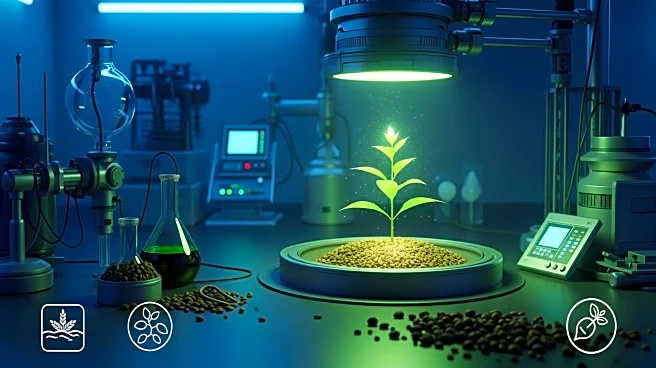What's Happening?
Researchers, led by Nolan, are advancing precision genetic engineering techniques to improve crop resilience and efficiency. By focusing on subtle modifications to a plant's gene expression, they aim to enhance traits such as root growth, water and nutrient
uptake, and light capture. This approach involves understanding plant cellular processes and using hormones like brassinosteroids to regulate growth. The research highlights the importance of precise hormone application, as excessive or insufficient amounts can disrupt plant development. The team utilizes advanced techniques like single-cell transcriptomics to study gene expression in plants, particularly Arabidopsis thaliana, to achieve these modifications.
Why It's Important?
The development of precision genetic engineering in agriculture holds significant potential for enhancing crop resilience to environmental stresses such as drought. By improving water and nutrient uptake and optimizing light capture, these techniques can lead to more sustainable agricultural practices. This could benefit farmers by increasing yields and reducing resource inputs, thereby supporting food security and environmental conservation. The ability to modulate plant growth with precision could also reduce the need for chemical fertilizers and pesticides, aligning with global efforts to promote sustainable farming and reduce ecological footprints.
What's Next?
Future research will likely focus on refining these genetic engineering techniques and expanding their application to various crops beyond Arabidopsis thaliana. Collaboration with agricultural industries could facilitate the integration of these advancements into commercial farming practices. Stakeholders, including policymakers and environmental groups, may engage in discussions on regulatory frameworks to ensure safe and ethical implementation. Additionally, public awareness campaigns could be initiated to educate consumers and farmers about the benefits and implications of genetically engineered crops.
Beyond the Headlines
The ethical considerations of genetic engineering in agriculture are significant, as they involve altering natural processes. There may be debates on the long-term impacts on biodiversity and ecosystem balance. Furthermore, the technology could lead to shifts in agricultural labor markets, as precision farming may require new skills and training. The cultural acceptance of genetically modified organisms (GMOs) remains a contentious issue, potentially influencing consumer preferences and market dynamics.














